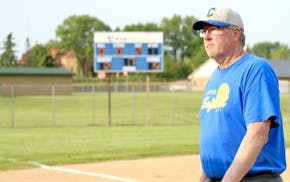Lynn Rogers, Minnesota's embattled bear researcher, said Tuesday that his internationally popular den-cam video and the bear socialization studies he conducts might come to a halt as a result of a judge's ruling in his long-running battle with the state Department of Natural Resources (DNR).
Chief Administrative Law Judge Tammy Pust recommended Tuesday that the DNR stick to its decision to deny the renewal of Rogers' state research permit.
Pust sided with the agency's concerns that Rogers' practice of food-conditioning and habituating about 50 bears in the Ely area has created a public danger. "The vast majority of wildlife management professionals agree that the presence of habituated bears increases the risk of harm to the public," Pust wrote.
The judge cited testimony from a two-week hearing in March, when witnesses described collared and uncollared bears in the Ely area engaging in unnatural behaviors, such as failing to startle when confronted by loud noises or nipping and slapping at people unable to provide them with food.
Rogers, who has built an international following for his $1 million-plus research center, said he will appeal. He said that the loss of his research permit would strip him of the ability to track bears with radio collars and that would undercut other aspects of his work.
Rogers said in an interview that the judge had many positive things to say about his research, including special praise for the streaming live shots of the animals in their winter homes. The "den cams," which included last year's YouTube sensation of a black bear named Lily giving birth, have been beneficial to the scientific community as well as the public, the judge wrote.
But Rogers said he needs radio collars to find the bears in the summer and "den cams" to view them during hibernation without disruption — two core techniques that he won't be allowed to resume without a permit.
"This is not good for bears, people or the state," Rogers said. "This decision was not in the public interest."
Pust's ruling takes the form of a recommendation, which will be reviewed by the DNR. Rogers said that if the DNR wins this time, he doesn't think the agency will ever grant him a permit.
What's next
DNR spokesman Chris Niskanen said the agency has assigned Kent Lokkesmoe, an "impartial" manager in the agency's operations services division, to make a final decision in the case. DNR staff members first rejected Rogers' application for a permit renewal last June. Lokkesmoe will be advised by a lawyer from the state attorney general's office, Niskanen said. A ruling is expected by early September.
A key issue was whether Rogers was taking bears into his possession, as the DNR claimed. Rogers argued that he does not exercise sufficient control over the bears to constitute "possession" and therefore is not required to have a permit.
The judge sided with the DNR on that question, saying the collars allowed Rogers to access bears in a way that no other Minnesotan enjoys. "Dr. Rogers exercises an intentional power to alter the bear's natural freedom in at least one critical respect: the bear is no longer free to avoid humans," the judge wrote. "It loses its natural ability to be left alone."
Pust rejected the DNR's reasoning on another point — that Rogers didn't deserve renewal of the permit because he hadn't produced peer-reviewed, scientific studies.
Rogers' conduct questioned
But she said denial of the permit was supported by videotape that showed "unprofessional conduct" by Rogers with research bears. In one video, a bear is made to appear to "dance" by being offered and then denied food rewards. In a second video, Rogers is seen punching a bear in the face when it lunges at him after running out of food, the judge wrote.
Pust concluded that Rogers should still be allowed to feed bears and run field study courses for the public, including den cam footage he has already shot.
Pust also wrote that the already habituated bears will allow Rogers to continue to "walk with them, rest with them, talk to them, observe them and record data about them."
Staff writer Paul Walsh contributed to this report. Tony Kennedy • 612-673-4213
Man agrees to 6-year sentence for fatally shooting Hopkins man on edge of downtown Minneapolis

Softball coach, with record delayed but not denied, keeps winning
Ludacris and T-Pain to stand up together at Minnesota State Fair grandstand in 2024
13-year sentence for man who fatally hit other driver while fleeing police in Oakdale

